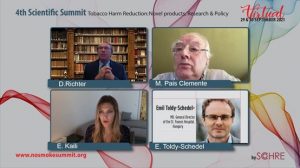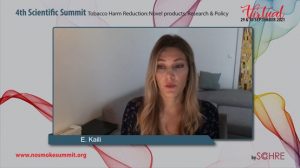The second day of the Summit started with a very interesting panel discussion, chaired by Dr. Dimitri Richter, where prominent panellists explored the question to what extent scientific data drive political decisions.
The concept of reduced harm is based in nicotine, which though addictive and not risk-free, is not the primary cause of smoking-related diseases and it doesn’t seem to be a major contributor to cigarette-induced atherosclerosis, Dr. Richter said.
The biggest problem, Dr. Richter said, is that even after an acute coronary syndrome more than half of the patients resume regular smoking in one year. Although varenicline is an excellent drug and helps patients to stop smoking, we have to face the fact that a large proportion of these patients relapse. The reason for that is that smoking causes, except of physical addiction, a psychological addiction that is more difficult to be contained.
US law has established a special separate category for tobacco products, been regulated by the FDA, Dr. Richter continued, and all new products must provide significant scientific data before they can be sold, they must have a file which shows that they prevent public health better than existing ones. FDA expects a “substantial dossier” of evidence with Chemistry analysis, Toxicological studies, Clinical studies, Perception and behavioural studies, post-market program.
IQOS got the authorization to be sold in the US market through this system after the file submitted to FDA was checked, he added, followed by the approval of claims about lower risk and reduced exposure to chemicals.
The question is what Europe does on this subject, Dr. Richter underlined. Should Europe follow the FDA’s example? EU has not any relevant regulations and the concept of harm reduction is not present in the recent Beating Cancer Plan of EU, he said, asking Ms. Kaili to comment.
Describing ongoing procedures in the European Parliament, Ms. Eva Kaili spoke about the Parliament’s decision to coordinate and harmonize policies, to build a new approach of the EU health strategy, which includes early detection, prevention, proper diagnosis, treatments, care and quality of life.
One of the main targets of the Beating Cancer Plan is to reduce tobacco users to 5% by 2040; novel products will of course be explored, to see which ones are less harmful and how we can use them to achieve this target. There is also a discussion about packaging again, about banning the flavours, and the continuation or not of advertising.
The revision of the Tobacco Taxation Directive, as well as the Tobacco Products Directive, that are expected soon, she added, will offer us enough data to decide in which direction we are going to move.
One of the EU priorities is the research on tobacco consumption, Ms. Kaili said. Concerning the question if the European Parliament’s policy decisions are driven or not by scientific data, Ms. Kaili said that policy makers are given options so they can decide based on scientific data and not just on the news or non-verified sources. In the European Parliament there are many committees that do a lot of preparatory work before any legislation is put forward, she explained. This means we conduct several studies, she said, and some of the new products of tobacco industry, for example IQOS, already seem―based on the data we have―to be less harmful; so they could be very useful.
Nevertheless, it is true that the transition to less harmful tobacco products is a difficult discussion for politicians, Ms. Kaili noted since their target is to have tobacco-free societies. That’s why we need scientific data, and we have to participate more in discussions with scientists, to be open-minded, to listen and to understand that we cannot ignore the fact that we have 25% of tobacco users. So, we must be able to explore all the solutions, she concluded.
Professor Manuel Pais Clemente, MD, PhD, Retired Full Professor of Department of Otorhinolaryngology, Porto University School of Medicine, Vice President of European Medical Association, President of World Voice Consortium, Porto, Portugal, emphasised that Europe should definitely follow the FDA’s example concerning harm reduction.
Been in medical practice for almost 5 decades and having participated in numerous Smoking Control initiatives and organizations all these years, Professor Clemente underlined that although smoking prevention and cessation policies have reduced the number of smokers, his experience shows that these policies alone are not sufficient to prevent smoking-related diseases and mortality caused by this addiction.
Evidence supports the efficacy of harm reduction approach that reduces risk behaviours, helping people and saving lives, the panellist said, therefore harm reduction should be a complementary policy to smoke prevention and cessation. We should keep the politicians well-informed about these developments and technology innovations, to be able to take the most correct decisions, legal measures, and policy recommendations.
We should have a team approach to move forward with new scientific information, new concepts of smoking prevention and new relationships with the tobacco industry, health professionals and consumers. Public health policies should be based on science and be always aligned with scientific evidence. WHO advises smokers to stop smoking, which is correct, but quitting is not easy and millions of smokers fail to do so with or without medical assistance. Particularly for these cases, we have to do something, to look for new alternatives and harm reduction approach as a strategy to decrease the morbidity and mortality of smokers.
FDA’s authorisation to a tobacco heating system is a landmark decision, Professor Clemente pointed out, since it recognizes role of science and adult smokers’ right to be fully informed about different risks if they chose to continue smoking.
Harm reduction came to stay, Professor Clemente added, since there will always be smokers and we need new alternatives to help these people suffer less health consequences. Smokers should be put at the core of our solutions, as we physicians place our patients at the core of our actions, the panellist suggested. Regulators and politicians should also do the same, make choices based on science to improve public health.
They say that politics is the art of the feasible, but doctors and scientists who believe in harm reduction also try to do the feasible, Dr. Richter said. The perfect situation would be to live in a smokeless world, but smoking is here, it is sold legally, it is addictive and not all people have the capacity to stop it, he added. Harm reduction, at least in medicine, is a really new concept, in the sense that we advise the patient to do something harmful, but much less harmful from what he is using; this is a completely different approach that may be difficult to be handled by regulators. But EU should regulate the claims, following FDA’s example, Dr. Richter said.
There is an ongoing discussion now in the European Parliament, Ms. Kaili said, and the Parliament prepares an initial Opinion, where there are different approaches from the parties but also inside the parties and we are trying to balance how we can talk about harm reduction without favouring products to continue to contain tobacco. Basically, we want to create a transitional phase, to be able to move to less harmful products but towards a zero-tobacco policy target, Ms. Kaili explained. Also, it is important that we try not to have different approaches among Member States, we try to build a common approach. Maybe EU is delaying, but we are gathering scientific data, the panellist said, and we are very interested to see how FDA made its assessments.
We are waiting for a European Regulation, Dr. Emil Toldy-Schedel said, since local regulations come from parties, politics and tax regulators and have medical issues; States usually don’t have enough medical knowledge to create decisions for regulations. Governments need new data to make good decisions.
On the other hand, there is also an ethical issue: we have no time to wait for the European Regulation since there is a lot of people who cannot quit smoking and we have to give them solutions. The idea of a non-smoking world is nice, but it will take many years for it to become true.
A European central regulation would be really helpful, Dr. Richter said, asking Ms. Kaili the reasons for which tobacco harm reduction is not included in the “Beating Cancer Plan”.
Beating Cancer Plan is an initial draft, it is not final, and we have more than one thousand amendments, Ms. Kaili explained. Harm reduction is mentioned in these amendments, she said. Nevertheless, we need additional research and specific scientific data; we cannot put all the products in the same basket, we must be able to understand the differences.
We need new data, but who is going to pay for them, wondered Dr. Richter, mentioning the recent report of WHO (2021) about harm reduction, which recognizes there are studies for heat-not-burn products showing they do less harm, but contains the negative comment that most studies are funded from industry.
We must realise the importance of Harm Reduction, Professor Clemente said; it is the third pillar in smoking control strategy, following prevention and cessation. WHO should recognize in the future that they are wrong. We cannot be “arms-crossed”, people die, we must do something for these patients (they are patients because smoking tobacco is a chronic disorder) that cannot quit smoking. Europe is always delayed compared to the USA, he added.
Dr. Toldy-Schedel expressed his agreement, in theory, that studies should have an independent financial background; but, he commented, we need data now and for good data we need financial background.
We all know that we need independent studies, Professor Clement noted, but we need also good studies and at this moment, the industry can pay for them. During the last decades European Commission has spent a lot of money in campaigns, why not to donate money to an institute to use it for a large independent study related to harm reduction, Professor Clemente asked.
Europe sometimes delays, Ms. Kaili said, but we are trying not to allow harmful products in the markets and to be able to provide directions based on science, in order to change the current status.


